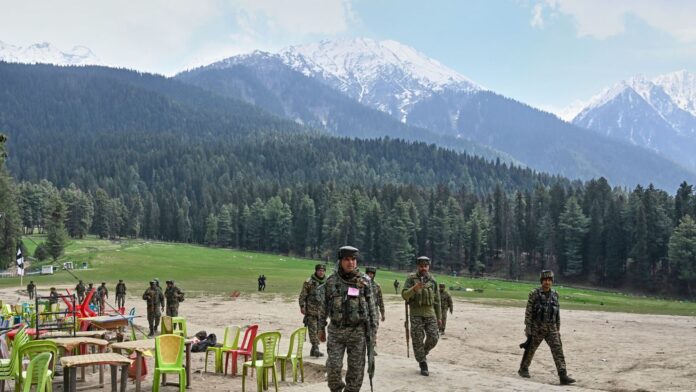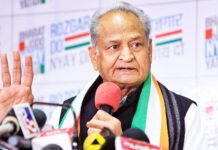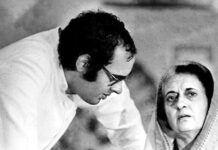Pahalgam attack is an inflexion point in our history that calls out for deep introspection; a moment in time to call a spade a spade; a time to make honest judgements about ourselves, call out the deficiencies in our society.
Operation Sindoor in which India levelled at least nine terror camps and inflicted discernible damage on prominent Pakistani air bases including its flagship air base of Nur Khan barely 10 km from Islamabad (confirmed by satellite imagery), was a courageous and befitting military response to the cowardly attack on predominantly Hindu tourists at Pahalgam on April 22; this decisive action demonstrated the superiority of our armed forces and their ability to strike deep into Pakistan at will.
However, it would be shortsighted to believe that a single, purely military response like Operation Sindoor, despite its significant impact, will deter Pakistan from its shenanigans or eradicate terrorism. Accordingly, PM Modi has unequivocally stated that this is just a pause.
The genesis of Pakistan-sponsored terrorism is far more complex and deeper; it is a multifaceted, dynamic theater with a host of actors contributing advertently or inadvertently to the barbaric game plan. Therefore, we need to understand the construct of this unholy nexus. Pakistan is undoubtedly the evil mastermind of this state-sponsored terrorism; a criminal enterprise conceived and managed by the Pakistani Army, egged on by religious zealots and for which the civilian government provides diplomatic cover.
But we cannot overlook the role of local actors, especially Kashmiri separatist Muslims who have actively colluded with Pakistan to plan and execute these killings over the last 30 years. Finally, we need to address the intransigent attitude of some of India’s Muslims, the timidity of the Hindu majority, and the ideological fixation of our woke liberals—all of which inadvertently play into this ugly narrative choreographed by Pakistan.
We continue to be the target of repeated terrorist attacks because we are perceived as a soft state, a fickle-minded nation fraught with dissensions and incapable of strong, decisive and consistent action. Operation Sindoor has to some extent changed that presumption.
At the crux of our vulnerability is our never-ending naivete. Slogans like Aman ki Asha and Ganga-Jamuna Tehzeeb are a pie in the sky that only serve to delude us, to lull us into a false sense of complacency; they undermine our resolve to deal firmly with Pakistan. All Indians must realize the futility of these fuzzy notions of amity and move away from such paralyzing concepts. We have tried this experiment for over 75 years and failed; persisting with this defunct approach is sheer folly.
All ties at every level with Pakistan must be scaled down. The much-touted people-to-people contact has proved to be meaningless. While IPL has been unwavering in its decision not to allow the participation of Pakistani players since the Mumbai terror attack in 2008, Bollywood continues to flirt with Pakistani artistes. This must end. Ostracization must not be looked upon as an expression of hate but as an edifying tactic to make Pakistan return to a semblance of civility.
Yogendra Yadav, a well-known peacenik (A Stable and Peaceful Pakistan is in India’s national interest, I.E. May 17) writes: “A stable, democratic and peaceful Pakistan is in our national interest.”
True. But a stable, democratic, and peaceful Pakistan is an anomaly. If it has not happened in the last 75 years what guarantee is there that it can occur now or will ever occur? While we wish well of Pakistan and its people, for now, we have to function on the premise that Pakistan is a failed state that actively sponsors terrorism. Delusionary optimism is a recipe for national disaster; it encourages unjustified restraint and enhances our vulnerability.
Furthermore, Yogendra Yadav tries to draw a link between “the long-standing alienation of the Kashmiri people” and terrorism: a morally unsustainable argument that only feeds into the terrorist narrative.
At Pahalgam, Hindus were selectively identified and executed Nazi style. If this can happen in a predominantly Hindu nation, then Hindus need to ask themselves why?
Traditionally, the Hindus have been timid, non-confrontational with a focus on individuality rather than a collectivity. The nationwide outrage that we see today post-Pahalgam is a rarity; it is probably because the victims included Hindus from all over India. But this has not always been the case. When Kashmiri Hindu Pandits were specifically being targeted, in the 1990s—killed and driven out of their homes—the larger Hindu community chose to remain silent; a silence that emboldened Kashmiri separatist Muslims to actively collude with Pakistan in fomenting unrest in Kashmir and in driving away Kashmiri Hindus from their homes. The ethnic cleansing of Kashmiri Hindus from Kashmir is a gargantuan moral failure of our country as a whole and of the pan Indian Hindu majority community in particular. Had a united Hindu community sent out a strong message to Kashmiris when Hindus were being driven out in the 1990’s that such behavior is unacceptable, things may have been different today.
Hindu unity need not be perceived as a bullying force to intimidate minorities but as an altruistic influence to ensure that the principle of tolerance and pluralism, the hallmarks of our civilization will prevail.
India’s woke liberals are going to town posting pictures of Kashmiri Muslims helping tourists at Pahalagm and lauding them for their Kashmiriyat. But let us not get carried away by these isolated gestures of kindness and forget the past. These are the same Kashmiri Muslims who came out in thousands to honour dead terrorists. These are the same Kashmiri Muslims who waged a street battle against our Army pelting them with stones to create chaos in Kashmir so that terrorism could flourish. These are the same Kashmiri Muslims who killed Hindu Pandits, burnt their homes and were complicit in the ethnic cleansing of 250,000 Kashmiri Hindu Pandits from Kashmir. Kashmiri separatist Muslims have created a Frankenstein whom, now, they cannot get rid of.
Nevertheless, if Kashmiri Muslims have had a genuine change of heart, we must give them the benefit of the doubt and appreciate their efforts. However, to fully gain the trust of all Indians, they need to do more. They must disassociate completely from terrorism and hand over all terrorist sympathizers from their midst. Pahalgam lies nearly 200 km from the LoC; it is unlikely that the terrorists could have reached there without local assistance. And the fact that all the Kashmiri Muslims present at the attack site (save for one) were spared raises disturbing questions of complicity.
A terrorist has no religion is a cliché that is mouthed every time there is a horrendous terrorist attack. This assumption is a false patois that allows one to evade responsibility and conveniently absolves the community from confronting the issue. The ideology of “othering of non-Muslims” as Kafirs (exemplified by the Pahalgam attack) propagated by some within the Muslim community whether due to misinterpretation or not calls for correction, a task that the larger Muslim community must address.
Additionally, Indian Muslims must avoid the tendency to play the victim card at the drop of a pin; it only plays into the terrorist narrative. The CAA in no way affected Indian Muslims but yet they chose to make an issue of it, claiming that they were being discriminated against. Protests against the Waqf Bill also fall into this category: a protest that lacks logic or understanding and which has no real impact on law-abiding Muslims.
The Pahalgam terror attack was a sentinel event in the history of terrorism in India; a blatant and brutal attack that specifically targeted Hindus and one that surprisingly for the first time galvanized the entire country. This ghastly attack, apart from the immediate loss of innocent lives, carries a far greater message for all Indians—Hindus, Muslims, and the government in particular. It is an inflexion point in our history that calls out for deep introspection; a moment in time to call a spade a spade; a time to make honest judgements about ourselves, call out the deficiencies in our society without the filter of political correctness and apportion blame where it is warranted if we really want to defeat this scourge of terrorism.








